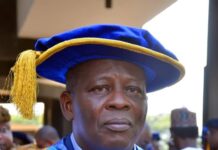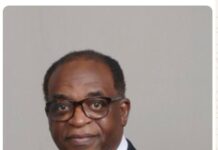 Since the flag off of campaigns by political parties and their candidates in the coming presidential election in Nigeria, the candidates, especially the two major contenders, Muhammadu Buhari of All Progressives Congress, APC and President Goodluck Jonathan of Peoples Democratic Party, PDP, have said a lot.
Since the flag off of campaigns by political parties and their candidates in the coming presidential election in Nigeria, the candidates, especially the two major contenders, Muhammadu Buhari of All Progressives Congress, APC and President Goodluck Jonathan of Peoples Democratic Party, PDP, have said a lot.
However, while it is commendable that the PDP and President Jonathan’s spokespersons had advised candidates and political parties to ensure their campaigns are issue based devoid of verbal attacks on their opponents, the President seems to be the first to jettison the advise as he has concentrated more on either rebuking his major opponent or replying Buhari and his party on each campaign ground, beginning from Lagos even after he had personally told his men on Tuesday 6th January at the inauguration of his campaign team never to engage his opponents in personal attacks.
Some of the things the President talks about Mohammadu Buhari with derisive intents are actually selling points for the retired General and former military Head of State who headed a government that confronted corruption even at a period it was just manifesting its hydra figures. When the President says Buhari wants to be President because he wants to fight corruption by sending corrupt people to jail, he is clearly doing a good marketing for the retired General. Most Nigerians want those who have turned our national treasury to their private vaults jailed and their loots recovered for public use.
Ordinarily, a President that has “performed so wonderfully” since coming to office should talk more about his achievements and why he needed another term to do more. His angry speeches and statements so far do not seem to consider the Nigerian electorate as enormously intelligent enough to decipher 2011 from 2015. In 2011, not a few thought a change was needed. Not just a generational change from the bravado tactics of a man that will tell his advisers as they were being sworn in that “I don’t have to take your advise” as President Olusegun Obasanjo said while inaugurating his advisers at the onset of his second term.
If there is a President most receptive of neo liberal socio economic policies against the poor in contemporary Nigeria, President Obasanjo ranks first with his mindless, surrogate economic policies that almost annihilated the economy and the populace. His regime gave neo liberal economic interests the Green Card which till this moment allowed agents of the World Bank and the International Monetary Fund overbearing seats in critical agencies and ministries of the Federal Government, drafting and directing anti- people policies, which of course are adopted without a blink by our governments.
But, under his leadership, his government made more impact in the battle against corruption, even as selective as they were, he still can’t be described as a “motor park tout” the way President Jonathan reacted to the criticism he(Obasanjo) lashes at his government’s lackluster attitude to corruption and governance in general. There is no civility in such reaction.
That Obasanjo has turned himself the most prominent critic of the man he admitted he found clean and decided to nominate as late President Yar’Adua’s running mate in the 2007 election also shows that the struggle against corruption is beyond the individual targets. It is a systemic crisis. It is indeed a product of a system that is not people- driven; and certainly not people- centred.
And as for Buhari, if he wants to be taken seriously on his anti corruption commitments, he should think beyond just jailing culprits. A total restructuring of all the structures, including the constitution, the judiciary, law enforcement, security, revenue generation and sharing, job creation, functional state structures etc, is what is needed. As good as the jail is for thieves, the system that produces, sustains and accommodates them need to be upturned.
Corruption is not anything abstract. It is a part of a system peopled with unpatriotic, selfish and ruthlessly corrupt, irretrievably irresponsible public officers. It is a product of a structure covered by constitutional provisions that legalises stealing, incompetence and underdevelopment.
Fighting corruption is truly not just about sending people to jail as the President consistently say as he campaigns, but it is an important part of the battle. Rewarding those found guilty of corrupt practices with national awards as the Jonathan administration had done couldn’t have been a good idea of how corruption can be eliminated. It makes it look lucrative and this is why (many people) insist that the Jonathan administration has encouraged corruption much more than any previous Nigerian government-including the Ibrahim Babangida administration that is famed for transforming corruption into a major industry- as people with no visible source of income move around corridors of power when they should be in jail.
When Mr. Femi Otedola was fingered by a report of the National Assembly, especially the House of Representatives, to have been involved in diverting petroleum subsidy funds to private use, the President moved around with him in intimate companionship and in utter disdain for public interests. Evidently, our President has enormously encouraged corruption and he needs to admit this. If you are not sending anyone to jail, you should then stop cuddling those openly accused of corrupt practices.
The leadership Nigeria needs now is one that will restructure the system in a way that stealing will no longer be attractive. The judiciary must be restructured and repositioned as a truly independent arm of government that is capable of executing its judicial functions without bias or pressures from the executive or indeed anyone, no matter how powerful.
The police, indeed the entire security system requires urgent cleansing as they have become so politicised such that a Judge was beaten up within the precincts of his court in Ado Ekiti under the full presence of armed policemen who did nothing to apprehend (people involved in) such lawlessness.
Two weeks ago, those assembled in Akure to participate in the campaigns of the APC under the auspices of Walk for Change were tear gassed by the police who were reported to have told the organisers that they acted on “orders from above”. If corruption must be fought, a compromised police force is not required.
All the rascality displayed by state structures and their agents against public interests; the disdain with which the Nigerian people have been treated when those accused of pocketing what has been budgeted for public infrastructures promotes impunity and our President needs to talk about his commitment to end these if given a second term. Insulting opponents won’t give the votes.
We need the President to tell us, as he campaigns, why we still can’t have electricity even after he had boasted to the Nigerian public during his campaigns in 2011 that he will leave office if he can’t provide electricity in four years. We still don’t have electricity and it’s four years already.
Denja Yaqub is an Assistant Secretary at the headquarters of Nigeria Labour Congress, Abuja



